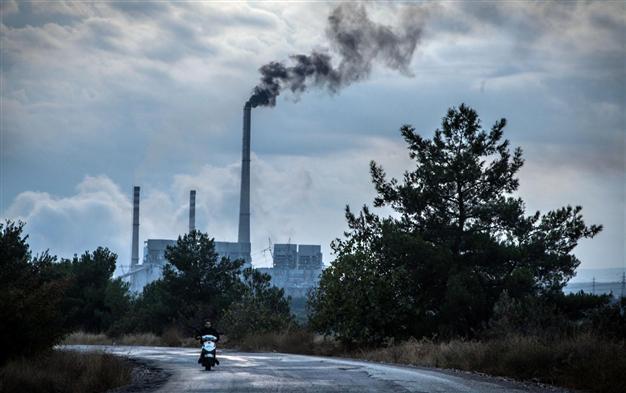Turkey among the worst performers in dealing with greenhouse gas emissions
ISTANBUL

A coal plant operates amid olive plantations near Soma, in the western province of Manisa.
Turkey ranks among the worst performers in dealing with rising CO2 emissions, according to a joined study submitted by Germanwatch and the Climate Action Network during the U.N. climate summit in Lima.The report listed the 58 highest emitters worldwide, which together produce nearly 90 percent of all greenhouse gases, and ranks them according to the steps they are taking to tackle climate change. Turkey featured near the bottom of the list in 51st place.
The report suggested that Turkey performed particularly badly in terms of energy efficiency and climate policy.
“According to Turkey’s national climate experts, the country has no national strategic planning policy to explicitly address climate change,” the report stated.
Quite to the contrary, the Turkish government has favored the construction of new coal plants across the country, often with hurried evaluation processes regarding the projects’ environmental impact.
“The fossil fuel industry is growing rapidly and, at least in the energy sector, most policies that are in place lack implementation,” the report also said regarding Turkey.
As is customary in the report, no country was ranked in the top three places, in order to stress that none of them are “doing enough” to tackle climate change.
After the vacant top three, Denmark ranked first, while countries such as Cyprus and Morocco also figured among those with the best performance.
Turkey came higher in the list than other big polluters such as Russia, Canada and Australia, and despite its lowly position actually rose two places compared to last year.
“The reason why Turkey rose by two positions is its promotion of renewables after 2012. No coal plants were opened in 2012 and there were more renewable energy plants integrated to the electricity system,” said Önder Algedik, from the Turkish branch of the “350 Group” founded by environmental activist and author Bill McKibben.
However, Algedik warned that this situation was only temporary and not the result of a planned strategy. “Next year, Turkey will again drop some positions once the plants built last year and in 2014 are added [to the electricity grids],” he said.
Turkey has been facing increasing local criticism as it bids to boost energy production, while the government has also generally failed to adopt comprehensive strategies regarding energy efficiency and development of renewables.
The Environment Ministry is increasingly coming under the spotlight for giving the green light to dozens of energy and construction projects across the country, often after bogus environmental assessment processes.
















